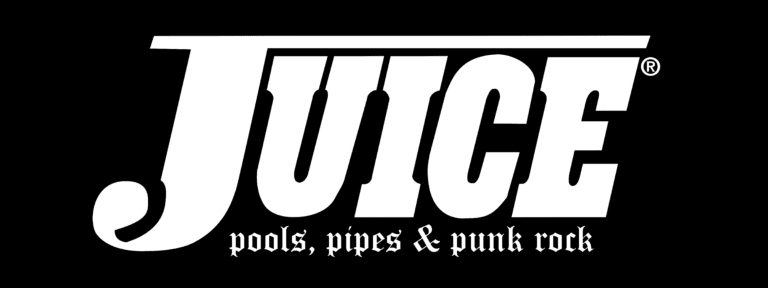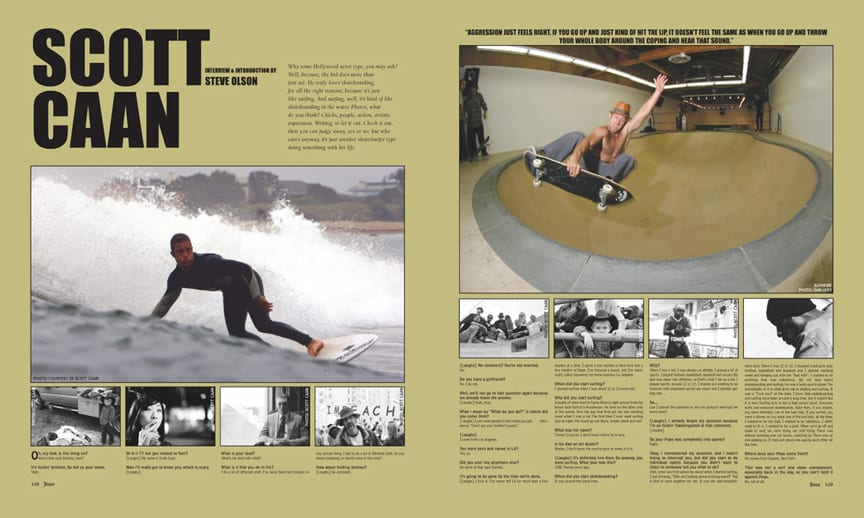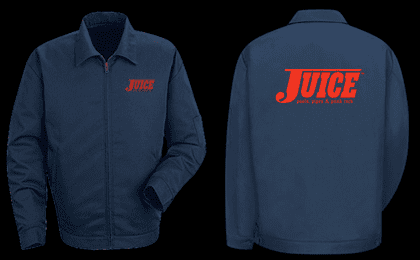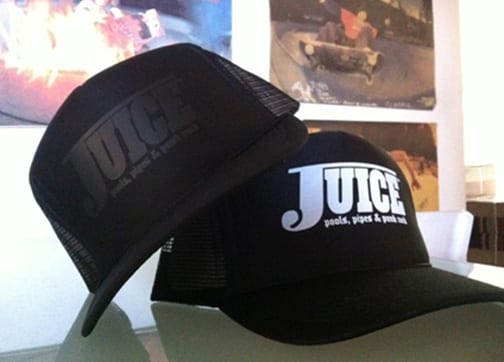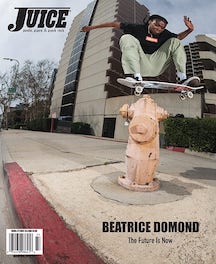INTERVIEW BY STEVE OLSON
INTRODUCTION BY STEVE OLSON
PHOTOGRAPHY BY DAN LEVY AND SCOTT CAAN
Why some Hollywood actor type, you may ask? Well, because, the kid does more than just act. He truly loves skateboarding, for all the right reasons, because it’s just like surfing. And surfing, well, it’s kind of like skateboarding in the water. Photos, what do you think? Chicks, people, action, artistic expression. Writing, to let it out. Check it out, then you can judge away, yes or no, but who cares anyway, it’s just another skate/surfer type doing something with his life.
“Aggression just feels right. If you go up and just kind of hit the lip, it doesn’t feel the same as when you go up and throw your whole body around the coping and hear that sound.”
Oh, my God. Is this thing on?
How’s that Jack Daniels, man?
It’s brilliant. So tell us your name.
Wait.
W-A-I-T? Are you related to Tom?
[Laughs] My name is Scott Caan.
Now I’ll really get to know you, which is scary.
[Laughs]
What is your deal?
What’s my deal with what?
What is it that you do in life?
I do a lot of different stuff. I’ve never been too focused on one certain thing. I like to do a lot of different stuff. Do you mean creatively, or sports-wise or fun-wise?
How about bitches?
[Laughs] No comment.
[Laughs] No comment? You’re not married.
No.
Do you have a girlfriend?
No. I do not.
Well, we’ll not go to that question again because we already know the answer.
[Laughs] Yeah, okay.
What I mean by ‘What do you do?’ is where did you come from?
[Laughs] I come from Los Angeles.
You were born and raised in LA?
Yes, sir.
Did you ever live anywhere else?
No more of that Jack Daniels.
It’s going to be gone by the time we’re done.
[Laughs] I love it. I’ve never left LA for more than a few months at a time. I spent a few months in New York and a few months in Texas. I’ve traveled a bunch, but I’ve never really called anywhere my home besides Los Angeles.
When did you start surfing?
I started surfing when I was about 12 or 13-years-old.
Why did you start surfing?
A buddy of mine lived in Santa Monica right across from the beach near Patrick’s Roadhouse. He lived on the other side of the tunnel. He’s the guy that first got me into smoking weed when I was a kid. The first time I ever went surfing was at night. We would go out there, smoke weed and surf.
What was his name?
Timmy Corcoran. I don’t know where he is now.
Is his dad an art dealer?
Maybe. I don’t know. He used to give us weed, if it is.
[Laughs] It’s definitely him then. So anyway, you were surfing. What year was this?
1988. Twenty years ago.
When did you start skateboarding?
It was around the same time.
Why?
When I was a kid, I was always an athlete. I played a lot of sports. I played football, basketball, baseball and soccer. My dad was super into athletics, so that’s what I did as a kid. I played sports. Around 11 or 12, I started not wanting to be involved with organized sports any more and I started getting into…
So…
Can I answer the question or are you going to interrupt me every time?
[Laughs] I already forgot my question because I’m so flabbergasted at that comment.
[Laughs]
So your Pops was completely into sports?
Right.
Okay. I remembered my question, and I wasn’t trying to interrupt you, but did you start to do individual sports because you didn’t want to listen to someone tell you what to do?
Well, when you first asked me about when I started surfing, I was thinking, ‘Why am I talking about smoking weed?’ But it kind of went together for me. It was the anti-establishment deal. When I was 11 or 12, I stopped wanting to play football, basketball and baseball and I started smoking weed and hanging out with the ‘bad kids’. I wanted to do anything that was rebellious. My old man hated skateboarding and surfing. He was a team sports player. The individuality of it is what drew me to skating and surfing. I know that skateboarding and surfing have been around a long time, but it wasn’t like it is now. Surfing now is like a high school sport. Everyone surfs and everyone skateboards. Back then, if you skated, you were definitely one of the bad kids. If you surfed, you were a stoner, so you were one of the bad kids. At the time, I wanted to be like that. I wanted to be rebellious. I didn’t want to fit in. I wanted to be a punk. When we’d go off and skate or surf, we were doing our own thing. There was nobody standing over our backs, watching us. There was no one judging us. It was just about one-upping each other all the time.
Where does your Pops come from?
He comes from Queens, New York.
That was not a surf and skate environment, especially back in the day, so you can’t hold it against Pops.
No, not at all.
I did the same exact thing because my old man came from Duluth, Minnesota. It’s more about you becoming your own individual.
Yeah. Sports and creativity go together. Not that I was doing anything innovative at the time, but skateboarders were originals. The people that I looked up to were guys like you, Scott Oster and Christian Hosoi. Those are the kinds of people I wanted to be. I didn’t look up to Michael Jordan. I did, in a way, but more than anything, the people that I wanted to emulate were surfers and skateboarders. At the time, it was more skating than surfing, but now I’m more obsessed with surfing than I ever was. I’ve always been a skateboarder. Now when I skate, I try to emulate surfing.
Do you ever surf and try to emulate skateboarding?
I try to do both, but I think my skateboarding has more of my surfing style. When I skate, I’m definitely trying to surf a little bit. There are things I can do on a skateboard that I wish I could do on a surfboard. I’m just a little backwards.
Don’t even go there.
No, it’s true.
Don’t open that door. You know Pandora’s Box?
Don’t open it?
[Laughs] Yeah. So what do you think it was that drew you to surfing and skateboarding?
I think it was the style. I think it was the people. I think it was the rebellious aspect of it at the time. Nobody in my school skateboarded. There were only four of us. We were also the same kids that did graffiti and ditched school. All the other kids were applying to good high schools and we were skating, surfing, smoking weed and trying to get in trouble.
It was the easiest way to not have to go to school?
Yeah.
But you’re not against education or learning?
No. I just hated school. I couldn’t pay attention. I went to a private school and got suspended once for bringing my skateboard. I wasn’t even riding it. You weren’t allowed to bring skateboards to my school. You couldn’t even put it in your locker. I brought my skateboard to school and me and my friend Max Hunt got suspended. What’s funny is that I just went to a demo at that high school the other day. The whole high school was there watching kids skateboarding.
Who was skating?
It was little kids, no pros. It was a skate demo for charity, but I guess now you can take your skateboard to school.
[Laughs] Let’s go back to the question. What is it that drew you to skateboarding?
I think it was really the people. It was guys like Hosoi, Block and Oster. I’ve known Block my whole life and the people that were around him were the kind of people that I wanted to hang out with and be like. They had style.
How did you meet Block? Block is one of my favorite dudes ever.
I met Block when I was fourteen or fifteen. That’s when I was in the music business.
Let’s elaborate on that. What do you mean you were in the music business?
That’s another thing that went along with surfing and skateboarding for me. I dropped out of high school in my tenth grade year and got into music. I hooked up with the guys from Cypress Hill and House of Pain in ’91. Block was down with them. Block was our road manager.
No way.
I was fifteen-years-old and I was hanging out with Block.
What was the name of your group?
The Whooliganz.
Who was in The Whooliganz?
It was just The Alchemist and me. He’s a big producer now. He’s still one of my closest friends. He kept going in that game and I went a different way.
So you were white kids rapping?
[Laughs] Pretty much.
Society sets up these rules and rap is predominately for African Americans and then there is the exceptional white rapper. You guys were going against the grain again.
Absolutely. I was into anything to not have to go to school. I wanted to be a musician. I was writing music and rhymes when I was twelve-years-old. All of the stuff that’s considered cool now wasn’t cool then. Being a B-boy in the late ’80s and early ’90s was rebellious. Today, the whole hip-hop culture and skateboard culture is a way to dress. Back then, if you were a B-boy, you B-boyed. If you were a skateboarder, you skated. You didn’t just dress like a skater.
What year were you born?
1976.
You’re a bicentennial baby.
[Laughs] That question is too general.
No, it’s not general at all. It’s going to be pinpointed right now.
[Laughs] Okay. Please.
Your dad is James Caan.
Yes, sir.
Everyone knows Jimmy Caan. If they don’t, they’re idiots.
That’s true.
Your dad is totally wild and I dig him. It had to be rad growing up with a dad like James Caan.
Yeah. Well, my dad didn’t work on a lot on movies when I was growing up. He stopped working for fifteen years. From the time I was five until I was fifteen, I didn’t know who he was as an actor. He was just my dad. He wasn’t off on movie sets when I was a kid. He hung out with me. He was also a rebellious guy. His whole life had a lot of ups and downs. To answer your question, yeah, he was the shit; but to me, he was just my dad. I didn’t know him as James Caan, the big movie actor. As a kid, I never got to see any of his movies because they were all rated R.
No way.
I didn’t see The Godfather until I was 11 years old. When they shot him, I was like, ‘This sucks.’
How was that though?
It was weird. I turned it off. It bummed me out. Now I look back and watch his movies and I’m like, ‘Damn. He was great.’
I cried during Brian’s Song.
Everyone did. To answer the question, he was just my Pop. I didn’t know much about his life.
Well, besides everything else, he’s a rad actor, not to use Valley words. He was an excellent actor.
You’re from the Valley aren’t you?
Negative.
[Laughs]
So as a kid, you’re growing up with this dude who is really quite amazing. Your dad is out in the world and doing things. He’s not some carpet salesman. He exposes you to a lot of things.
Absolutely. He’s a creative dude. He inspired me to be creative in everything that I did. Being creative was something I felt stronger about than going to college and being a doctor or a lawyer. I was skating or surfing, or being in the music business or being a producer, a writer or a photographer.
I know you shoot photographs.
I shoot a lot of photographs.
You’ve been in the music business. You’ve written rhymes and produced music. You skate and surf passionately. And you also do films.
I write movies and direct films.
You also act in films.
Yes, sir.
I am so not a sir.
[Laughs] Yes, you are.
[Laughs] You have a variety of things that you dabble in.
I’ve always been like that. Sometimes it bums me out and I wish I could focus more on one thing.
Are you a Virgo?
I’m a Virgo/Leo.
That means you can do whatever you want.
Yeah, but I have dabbled a lot. I’m a jack-of-all-trades more than a master of one.
[Slurs.] I totally disagree with that. You’re not master of none.
I didn’t say master of none. I said master of one.
I understand that, but that’s insane.
[Laughs] You’re right. I shred.
You’re master of all. I’m so sorry. I would never be able to live if I could only do one thing.
Me neither.
That bottle of Jack is almost gone.
[Laughs] Is it really?
Yeah. Okay, my question is this. How did you get into photography?
I was directing my first movie.
What was the movie called?
It was called Dallas 362. My cinematographer, Phil Parmet, is a great photographer. He got me into film cameras, movie cameras, lighting and all the different aspects of making films. He taught me about lenses and how cameras work. I really got obsessed with it. Then my old man gave me this old Nikon. Phil showed me how to use it and it just took off from there. I never left home without my camera. I started traveling with it and shooting pictures everywhere I went. And I had rad opportunities to be in cool places. I was in positions that a lot of people don’t get to be in, so I would photograph that a lot of the time.
Is that bad to be able to share your situation with the public?
Oh, no. It’s great.
You actually have a good eye for photography.
Thank you.
You’re totally welcome. I’m going to break it down for you right now. You are very passionate about whatever you’re doing. Where do you think your passion comes from?
Well, we talked about my old man.
Is he a Virgo?
[Laughs] Virgo? No. My old man was very strict about if you were going to do something, be good at it. Be the best at it or don’t do it. Anyone can work hard and have God-given talent, but it’s a shame when people have it and don’t use it. You have to use all aspects of it. You have to be good at it and work harder than the next man. He always instilled that in me. Even when I was a kid, he’d say, ‘If you’re going to do something, do it right, do it hard and be passionate about it. Do it good or don’t do it all, because there is always someone else that wants to play harder than you.’
Okay, let me ask a question about that. That applies to all sports in general, including surfing and skateboarding. You’re passionate about everything, but you really love skateboarding.
Yes, I do.
When you skateboard, you’re in it to win it. Where does it come from when you rip the coping off the pool?
That’s a good question. I guess it has to do with the people I grew up watching skating. There was that aggression. It’s a different level of going harder and doing it better. Aggression just feels right. If you go up and just kind of hit the lip, it doesn’t feel the same as when you go up and throw your whole body around the coping and hear that sound.
What’s that sound?
Ksssssssssh.
What about when you go surfing?
That’s different. It’s the same feeling, but there’s something about being in nature. When I’m surfing a real up and down wave and I’m just trying to hit the lip or go fast or do a gnarly cutback, it’s very similar to the skateboarding mentality. A lot of times, I’m just cruising when I surf. If I’m having a miserable day, I can get in the ocean and everything goes away. Here’s the corny part. There’s something about being a part of nature. I think that surfing is one of the hardest sports to learn. There are a million people that can try it, but there are only a couple of thousand people that can actually do it. It’s finding that attunement with the ocean. When you find that perfect part of the wave, and you’re just cruising, it’s like nothing else exists. Surfing is my spirituality. If I want to choke somebody, I go surf and then I don’t want to choke them anymore. You drive to the beach going 100mph and you drive home going 30mph. You can’t wait to get there, but then you have a good session and you’re just cruising on the way home.
You’re stopping to talk to the chick in the car next to you.
That’s true.
Then it comes down to the pump.
[Laughs]
Let’s get into acting. How do you prepare for a role?
It depends.
I only bring it up because of the commitment and the passion you have. It’s as good as it gets.
A lot of times, you pick a role that’s really right for you and you step right in and you’re comfortable. I think that’s when you’re at your best. But if you do that enough times, then you get bored. That’s when you say, ‘I have to try something different. I have to go outside the box and do something different. I want to do something where I sweat and die a little bit.’
What about writing movies?
The reason I started writing movies was because I kept getting parts that I just kind of stepped into. I didn’t have to do a lot of work and I ended up getting sort of bored. When I first started acting, all I did was work on plays and spend a lot of hours in the theater. I was immersing myself in what I was doing. I wanted to be the best at it. I was like, ‘I’m going to do this and be the best actor in the world.’ Then I got into the movie business and maybe once every three years, I’d get a part that I could actually sink my teeth into. The reason I started writing was because I didn’t always get those parts. I figured I could write myself plays and perform things that I felt strongly about. That set me off on writing and directing. I ended up thinking, ‘I can do this too.’ I got really passionate about writing and directing. And now that I’m in my early 30s, I’m getting parts that I can really sink my teeth into it. Now I can go back to what really got me into acting, when it was something that I was super passionate about.
That’s sick. Who got you into acting?
When I was 17-years-old, I was in the music business. I was out on the 1993 Soul Assassins Tour and there was this director named Mitch Marcus who had heard about me, so he came and saw the show. He thought I’d be right for a part in his movie. He said, ‘Do you want to come and audition for this movie?’ I said, ‘No, that’s not my thing.’ Then I read the script. It was about this 17-year-old punk kid that gets out of juvenile hall and rides his motorcycle and carries a gun. Then I was like, ‘Okay. I’ll come in and audition.’ I ended up getting the part.
What part was it?
It was a movie called A Boy Called Hate. It’s not the greatest movie ever made, but once I got on that movie set, I was like, ‘Okay, this is what I’m going to do for the rest of my life.’ I was going to be a grip or an actor or writer or whatever I had to do to be on a movie set. Then I went straight to a theater school and studied for the next ten years. I started studying at Playhouse West in the Valley when I was 17-years-old. I started writing and directing plays. That’s been my center for acting for the last fifteen years.
What was it that got you so hyped on it?
Being on that set, I felt like I was around people that thought the same way that I did. There was something new every day. It wasn’t school. I felt like I was home. This was at the height of my music career and I completely forgot about music the second I got on a movie set.
From that point on, you’ve done a lot of work. You’re very focused.
Yeah.
When I go skate, I only want to go skate with you and a couple of other guys. It’s only fun to skate with other guys that are totally into it. It’s not like a competitive thing, it’s just like, ‘Here we are. We’re going to lay down the law and we’re going to hit it and we’re going to hit it as hard as we can.’
The competitiveness in skateboarding is more like everyone is on the same team, but it’s still competitive.
You’re rooting for other the guy to hit it and make you jump to the next level.
Yeah. There are certain people that I like to drop in right after because they get me so hyped.
In the Hollywood world, and the movie business, is it the same deal?
I guess it can be.
It’s a team effort to make a movie. Everyone has to have the same goal.
Yeah. It’s takes everyone to be a part of it. I never thought of it like that.
From the gaffer to the grip to the electrician, everyone has to do his or her thing. You have to work for the same goal, but when you skate and surf, it’s more of an individual thing.
If I’m skating by myself, I’m not going to skate as hard as when I’m skating with you and the boys. I go off harder when my boys are around to push me. It’s the same with surfing. When we’re all out in the line-up, and I’m coming down the line and everyone is there, I’m not just going to take that section, I’m going to try to do a big ass turn here and there and everywhere.
You’re working for the admiration of others.
You want to be good so your peers think you’re good.
FOR THE REST OF THE STORY, ORDER ISSUE #66 BY CLICKING HERE…
SHARE THIS POST:
- Click to email a link to a friend (Opens in new window)
- Click to share on Tumblr (Opens in new window)
- Click to share on LinkedIn (Opens in new window)
- Click to share on Pinterest (Opens in new window)
- Click to share on Twitter (Opens in new window)
- Click to share on Facebook (Opens in new window)
- Click to share on Reddit (Opens in new window)
- Click to print (Opens in new window)
